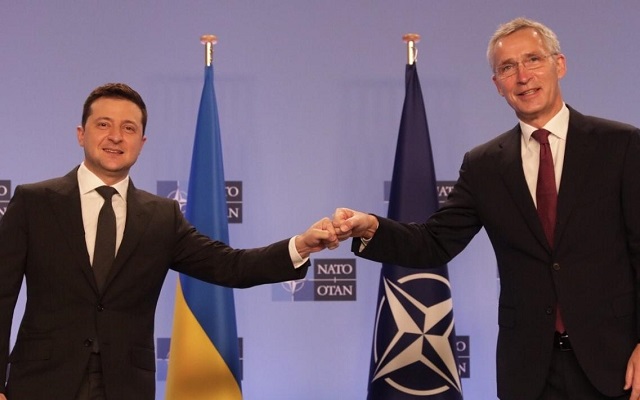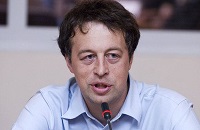
While Ukraine’s accession to NATO would be bad news for Putin, it could yield benefits for Russia’s citizens
COMMENT | KONSTANTIN SONIN | The recent NATO summit in Vilnius concluded with a pledge to admit Ukraine once its war with Russia ends. While the benefits of Ukraine’s accession to the alliance are well established, and most NATO countries view Ukraine as a prospective member, a consensus on the country’s immediate accession remains elusive.
But Ukraine and NATO’s existing members are not the only potential beneficiaries of Ukrainian membership. Even Russia, which invaded Ukraine under the pretext of preventing the alliance’s enlargement, has much to gain from this prospect. Ukraine’s entry into NATO would enable Russia to waste fewer resources on producing and stockpiling munitions. Although the Kremlin’s obsession with restoring the Russian empire will not vanish overnight, its impact on decision-making could be reduced. Much like Finland’s recent accession, once Ukraine’s entry is a fait accompli, it will cease to be a point of contention.
While Ukraine’s accession to NATO would be bad news for Russian President Vladimir Putin and his allies, it could yield significant benefits for Russia’s citizens. With the dream of imperial restoration all but dead, future Russian leaders would find it increasingly difficult to use revanchist and isolationist rhetoric to consolidate power. Moreover, a modern, forward-looking government in Moscow could prevent the emergence of a “Weimar Russia” scenario in which a defeated, economically paralysed state becomes a potential breeding ground for would-be tyrants.
The Costs of War
Although it is hard to calculate the direct costs of Russia’s war against Ukraine, even conservative estimates illustrate the conflict’s massive economic toll. Over the past 20 years, Russia is estimated to have spent billions of dollars on military equipment such as shells, tanks, howitzers, fighter jets, and helicopters, resources that could have been used to invest in essential public services like education and health care.
But the direct cost is arguably a fraction of the indirect expenditures. For years, Putin’s regime has sought to insulate Russia’s economy from global financial markets. Consequently, the Russian economy has languished since the late 2000s, evoking memories of the Soviet Union’s protracted economic stagnation (zastoy) under Leonid Brezhnev. The output and income lost between 2009 and 2022 amount to at least 10-15% of Russia’s GDP. And the invasion of Ukraine has likely compounded the country’s economic problems: while headline GDP figures show a mild 2-3% decline, retail sales fell by 6.7% in 2022.
Moreover, the GDP figures do not reflect the Russian economy’s structural shift toward regressive import substitution amid a massive exodus of highly educated workers. While the preparations for war in Ukraine have cost the country billions of dollars, the subsequent economic losses both direct and indirect will likely take decades to reverse.
To be sure, bringing Ukraine into NATO would not undo the damage Putin has inflicted on the Russian economy. But it would be much harder to justify prioritising military production over economic growth once the war ends. Ensuring Ukraine’s safety would also make it easier, faster, and safer to reintegrate Russia into global markets, accelerating its economic recovery and ensuring that post-war Russia will not exploit its trade ties to fund future aggression.
Putin’s Stalinist Tweak
In his brilliant biography of Joseph Stalin, historian Stephen Kotkin meticulously established how the Soviet dictator leveraged perceived external threats to gain and consolidate personal power. The relentless drumbeat of warnings about impending foreign invasions and monarchist insurrections was used to justify banning opposition parties and suppressing dissent within the Communist Party itself. Under the guise of rooting out foreign spies, Stalin conducted multiple elite purges and terrorised the population. Anyone who challenged him was quickly labeled an agent of a hostile foreign power.
Although the USSR’s brutal repression eased somewhat following Stalin’s death in 1953, the pervasive paranoia that characterised his rule persisted for generations as subsequent Soviet leaders used isolationist policies and an aggressive military buildup to consolidate their hold on power. This approach was bound to fail – and it did. Exorbitant military spending was one of the main causes of the Soviet Union’s collapse in 1991. While millions of people waited in line for bread, eggs, and sugar, the USSR devoted massive resources to manufacturing tanks and missiles. The political power wielded by the Soviet military-industrial complex was so immense that defense spending remained elevated even when it became patently unsustainable. In the end, the military budget was not slashed by government decree, but by the dissolution of the state.
Putin has added a new element to Stalin’s recipe. Whereas Stalin used terror to keep the Party’s leaders in line, Putin leveraged greed, using military spending to turn his associates into billionaires. The families of those who planned and executed the war against Ukraine from Putin himself to Defense Minister Sergei Shoigu, Security Council Secretary Nikolai Patrushev, and various cabinet ministers have all become extraordinarily wealthy over the past decade.
Similarly, the war itself has been profitable for Putin and his cronies. The Financial Times recently reported that Patrushev’s son played an instrumental role in expropriating the Russian assets of foreign food giants Carlsberg and Danone. Moreover, while Russia’s military budget has been growing annually since 1999, an ever-increasing share has been classified as a state secret.
The veil of secrecy surrounding Russia’s military spending has allowed domestic arms manufacturers to maintain profit margins that would be unattainable under normal market conditions. The Ukraine war’s first year has exposed the effects of rampant graft and corruption within the Russian military-industrial complex, including untrained troops and equipment that exists only on paper. Nevertheless, all the major figures who have profited from this corrupt war remain firmly entrenched in their positions.
Putin’s supporters often claim that Russia would lose the war in Ukraine without him. In reality, Russia will lose because this is a criminal war initiated by a ruler who has built a highly personalised, militarised regime centered around his and his accomplices’ desire to retain power and enrich themselves. If Ukraine joins NATO, Putin and future leaders like him will have a difficult time persuading Russians that massive military investments are necessary.
Provoked by Weakness, Deterred by Strength
Foreign affairs scholars such as Harvard’s Stephen Walt and the University of Chicago’s John Mearsheimer have argued that Russia’s posture toward Ukraine and other neighboring countries is a consequence, rather than a cause, of NATO’s expansion. This argument has been put to rest following Russia’s invasion. While Russia has indeed cited NATO enlargement as a justification for invading Ukraine, its annexation of four Ukrainian regions in September 2022 has proven that this is a war of conquest. Russian officials routinely deny the existence of the Ukrainian state, much like how Nazi and Soviet officials refused to recognise the Polish state in 1939.
The fact is that Putin’s war against Ukraine has catalysed NATO’s further enlargement, prompting Finland and Sweden to abandon their long-standing neutrality and ask to join the alliance almost immediately after the invasion. Finland joined in April, and Sweden is poised to become a member in the coming months.
Although these developments have extended Russia’s border with NATO countries by 1,340 kilometers (832 miles), Moscow’s response has remained muted. While the specter of NATO expansion has served Putin well as a propaganda tool, Russia does not consider it a serious threat. And though Ukraine’s potential accession remains valuable as a rallying cry amid Russia’s ongoing difficulties on the battlefield, its utility will diminish once the war concludes.
Russia’s interests might be the last thing that those who decide on Ukraine’s NATO membership – Ukraine itself and the alliance members – should take into account. But Ukraine’s accession would provide real benefits to Russia. First, strengthening Ukraine’s security would enhance the security of neighbouring countries, including Russia. As the final nail in the coffin of Russian imperialism, it would bring welcome relief to Russia’s citizens who have borne the costs of Putin’s vain ambitions. Most importantly, Ukraine’s entry into the alliance could act as a deterrent against a future Stalin or Putin who might be tempted to rely on isolationism and militarism to gain and retain power.
*****

Konstantin Sonin is a professor at the University of Chicago’s Harris School of Public Policy.
Copyright: Project Syndicate, 2023.
 The Independent Uganda: You get the Truth we Pay the Price
The Independent Uganda: You get the Truth we Pay the Price




Admission of Ukraine into NATO, which Ukraine was meant to be a buffer state, only proves one thing: The West can never be trusted.